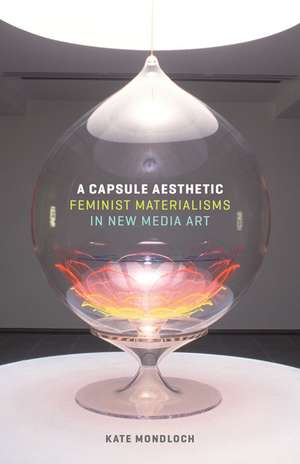A Capsule Aesthetic: Feminist Materialisms in New Media Art
Autor Kate Mondlochen Limba Engleză Paperback – 23 ian 2018
How new media art informed by feminism yields important and original insights about interacting with technologies
In A Capsule Aesthetic, Kate Mondloch examines how new media installation art intervenes in the fields of technoscience and new materialism, showing how three diverse artists—Pipilotti Rist, Patricia Piccinini, and Mariko Mori—contribute to the urgent conversation about everyday technology and the ways it constructs our bodies.
A Capsule Aesthetic establishes the unique insights that feminist theory offers to new media art and new materialisms, offering a fuller picture of human–nonhuman relations. In-depth readings of works by Rist, Piccinini, and Mori explore such questions as the role of the contemporary art museum in our experience of media art, how the human is conceived of by biotechnologies, and how installation art can complicate and enrich contemporary science’s understanding of the brain. With vivid, firsthand descriptions of the artworks, Mondloch takes the reader inside immersive installation pieces, showing how they allow us to inhabit challenging theoretical concepts and nonanthropomorphic perspectives.
Striving to think beyond the anthropocentric and fully consider the material world, A Capsule Aesthetic brings new approaches to questions surrounding our technology-saturated culture and its proliferation of human-to-nonhuman interfaces.
In A Capsule Aesthetic, Kate Mondloch examines how new media installation art intervenes in the fields of technoscience and new materialism, showing how three diverse artists—Pipilotti Rist, Patricia Piccinini, and Mariko Mori—contribute to the urgent conversation about everyday technology and the ways it constructs our bodies.
A Capsule Aesthetic establishes the unique insights that feminist theory offers to new media art and new materialisms, offering a fuller picture of human–nonhuman relations. In-depth readings of works by Rist, Piccinini, and Mori explore such questions as the role of the contemporary art museum in our experience of media art, how the human is conceived of by biotechnologies, and how installation art can complicate and enrich contemporary science’s understanding of the brain. With vivid, firsthand descriptions of the artworks, Mondloch takes the reader inside immersive installation pieces, showing how they allow us to inhabit challenging theoretical concepts and nonanthropomorphic perspectives.
Striving to think beyond the anthropocentric and fully consider the material world, A Capsule Aesthetic brings new approaches to questions surrounding our technology-saturated culture and its proliferation of human-to-nonhuman interfaces.
Preț: 138.73 lei
Preț vechi: 161.78 lei
-14% Nou
Puncte Express: 208
Preț estimativ în valută:
26.55€ • 28.39$ • 22.13£
26.55€ • 28.39$ • 22.13£
Carte indisponibilă temporar
Doresc să fiu notificat când acest titlu va fi disponibil:
Se trimite...
Preluare comenzi: 021 569.72.76
Specificații
ISBN-13: 9781517900496
ISBN-10: 1517900492
Pagini: 168
Ilustrații: 35
Dimensiuni: 140 x 216 x 20 mm
Greutate: 0.25 kg
Ediția:1
Editura: University of Minnesota Press
Colecția Univ Of Minnesota Press
ISBN-10: 1517900492
Pagini: 168
Ilustrații: 35
Dimensiuni: 140 x 216 x 20 mm
Greutate: 0.25 kg
Ediția:1
Editura: University of Minnesota Press
Colecția Univ Of Minnesota Press
Notă biografică
Kate Mondloch is professor of contemporary art and head of the Department of the History of Art and Architecture at the University of Oregon. She is author of Screens: Viewing Media Installation Art (Minnesota, 2010).
Cuprins
Contents
1. Eye Desire: New Media Art and New Materialisms after Feminism
2. Thinking through Feminism: The Critical Legacy of 1970s and 1980s Feminist Media Art and Theory
3. Critical Proximity: Pipilotti Rist’s Exhibited Interfaces and the Contemporary Art Museum
4. Unbecoming Human: Patricia Piccinini’s Bioart and Postanthropocentric Posthumanism
5. Mind over Matter: Mariko Mori, Art History, and the Neuroscientific Turn
Conclusion
Acknowledgments
Notes
Index
1. Eye Desire: New Media Art and New Materialisms after Feminism
2. Thinking through Feminism: The Critical Legacy of 1970s and 1980s Feminist Media Art and Theory
3. Critical Proximity: Pipilotti Rist’s Exhibited Interfaces and the Contemporary Art Museum
4. Unbecoming Human: Patricia Piccinini’s Bioart and Postanthropocentric Posthumanism
5. Mind over Matter: Mariko Mori, Art History, and the Neuroscientific Turn
Conclusion
Acknowledgments
Notes
Index
Recenzii
"Mondloch shows that new media art installations and theories of feminist materialism inform one another in ways of interest to artists, art historians, and new media and feminist scholars."—CHOICE
"Mondloch’s approach couples aesthetics and ethics through activist prose that is unafraid to embrace populism or pleasure, or to revisit theoretical and historical misreadings of the past (and present). This book does not attempt to explain anything. Rather, it practices, and invites us to practice, conceptual-material engagements with art, and thus sensation, perception, and action. Such practice, the author convincingly argues over the entirety of her manuscript, is intrinsically feminist."—Theory Event
"Mondloch’s approach couples aesthetics and ethics through activist prose that is unafraid to embrace populism or pleasure, or to revisit theoretical and historical misreadings of the past (and present). This book does not attempt to explain anything. Rather, it practices, and invites us to practice, conceptual-material engagements with art, and thus sensation, perception, and action. Such practice, the author convincingly argues over the entirety of her manuscript, is intrinsically feminist."—Theory Event
"Mondloch shows that new media art installations and theories of feminist materialism inform one another in ways of interest to artists, art historians, and new media and feminist scholars."—CHOICE
"Mondloch’s approach couples aesthetics and ethics through activist prose that is unafraid to embrace populism or pleasure, or to revisit theoretical and historical misreadings of the past (and present). This book does not attempt to explain anything. Rather, it practices, and invites us to practice, conceptual-material engagements with art, and thus sensation, perception, and action. Such practice, the author convincingly argues over the entirety of her manuscript, is intrinsically feminist."—Theory Event
"Mondloch outlines the importance of feminist new materialisms as a means to critique the realms of new media art and technoscience, and positions Rist, Piccinini, and Mori as vital contributors to all these discourses."—ARLIS/NA
"The fields of art, science, and technology are increasingly porous to each other, and Kate Mondloch insightfully explores the artistic interfaces where such exchanges occur."—Women’s Art Journal
